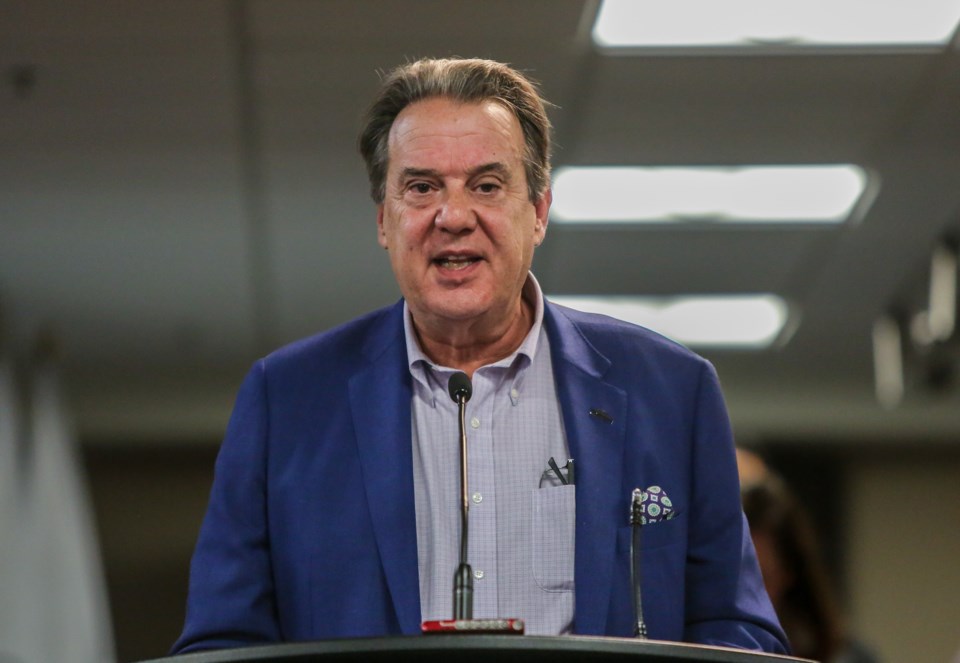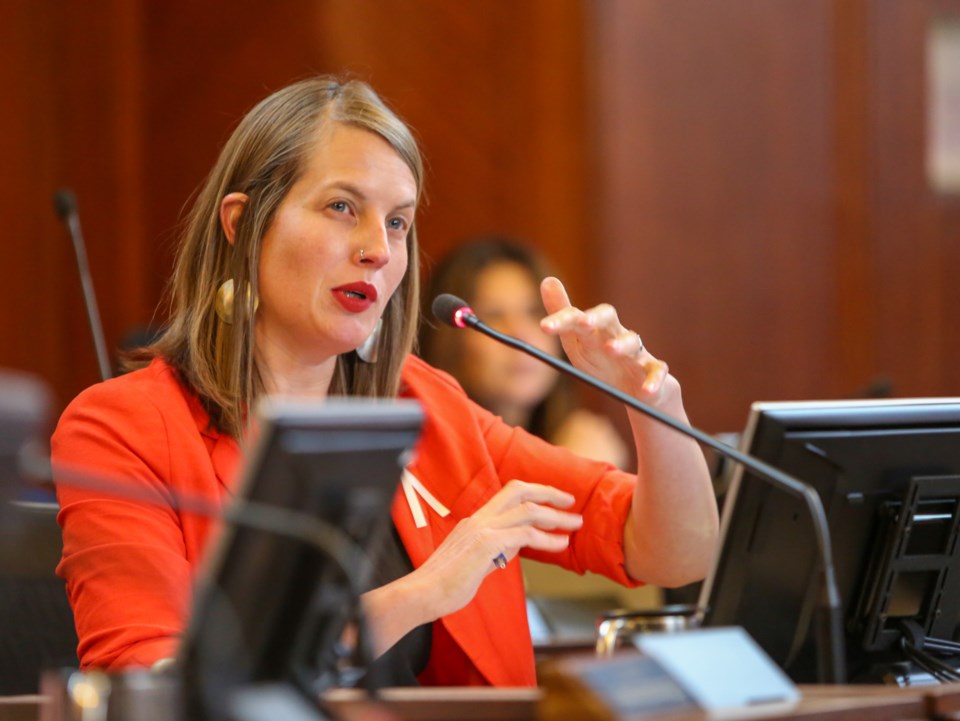The results of the Oct. 19 sa国际传媒 provincial election could not only have a direct effect on the makeup of Vancouver city council, but also trigger a $2-million byelection.
It all depends on whether voters in the riding of Vancouver-Little Mountain want Christine Boyle to be their next MLA.
If she wins, a byelection will be called.
If she loses, Boyle said she plans to keep her current job as a Vancouver city councillor, a position she’s held since first elected in 2018 as OneCity’s lone representative.
Why not finish out the term?
“On issues that I know matter to residents across Little Mountain and across the whole province, I think I can get more done at the provincial level to make life better, to make our communities healthier and safer than I am able to accomplish on this council,” she said Monday.
In April, Boyle defeated Andrea Reimer — a former Vision Vancouver city councillor — in a nomination race to become the NDP’s candidate in Vancouver-Little Mountain, which is the new name of what is essentially the soon-to-be scrapped Vancouver-Fairview riding.
The NDP’s George Heyman, the province’s long-time environment minister, is the current MLA of the riding, which has added other parts of neighbouring ridings for the Oct. 19 vote. Heyman will not seek re-election.

John Coupar
So far, Boyle’s only official challenger — according to Elections BC’s candidate list — is John Coupar of the Conservative Party of sa国际传媒
Coupar is a former longtime Vancouver park board commissioner and was the NPA’s candidate for mayor in 2022 until he from the race and was replaced by Fred Harding.
Vancouver is not without precedent of a sitting councillor seeking a provincial seat, with Tim Stevenson making an unsuccessful run with the NDP in 2005.
Stevenson, who was a member of COPE at the time, lost the Vancouver-Burrard race to the Liberals' Lorne Mayencourt by 11 votes.
He kept his city hall seat and got re-elected several times with Vision Vancouver until calling it quits before the 2018 civic election.
More recently, in October 2017, the NPA’s Hector Bremner after former Vision Vancouver councillor Geoff Meggs resigned in July of that year to take a job as chief of staff to then-premier John Horgan.
The same byelection included the election of a new nine-person school board after the previous board was fired in 2016 for not balancing its budget.
More changes of the same could be in play at city hall come Oct. 19.
But what happens when a councillor decides to run for a provincial seat? Do they have to step aside from their council duties? Declare a conflict when city business involves the provincial election campaign?
Glacier Media sent questions to the City of Vancouver to clarify what protocols and rules, if any, are in place that would apply to a sitting councillor seeking a provincial seat.
When a city councillor decides to run for a provincial seat, what are the requirements of that councillor when they decide to seek a provincial seat?
A local government elected official is not required to resign from their current local government elected position to run for the legislative assembly. However, any candidate for the legislative assembly would still be required to comply with the conflict-of-interest rules in the Vancouver Charter and Vancouver’s code of conduct bylaw.
Do they have to inform the mayor or city clerk?
No, unless they wish to seek a leave of absence via member motion which requires submission to the city clerk under the procedure bylaw (requires approval of council at a formal meeting of council).
Can they campaign during hours normally devoted to being a city councillor?
Council members do not have set hours. That said, the member would need to be mindful of potential conflict-of-interest rules in the Vancouver Charter and the code of conduct bylaw.
As an example, members of council are restricted from using city-issued equipment and other resources for political purposes, as set out in the following policy: Technology Acceptable Use Policy.
How does the City of Vancouver ensure the councillor elected by voters is adhering to their duties as a councillor when seeking a provincial seat? In other words, that they're not spending more time on provincial campaign business than what they were elected to do at city hall?
It is the responsibility of the member to monitor their actions as noted in the responses above.
If Coun. Boyle is elected in the provincial election, is she required to resign her seat as a councillor? If so, how soon? And how does that work? If a resignation is required, how soon could she resign? Immediately? Have to give a couple weeks' notice?
A resignation is not required by law, however, it is likely not practicable to hold both positions. If a member of council intends to resign from their local government position to run for or sit in the legislative assembly, Section 142 of the Vancouver Charter applies. It reads as follows: "A member of council may resign from office only by delivering a written resignation to the city clerk.
A resignation becomes effective when it is received by the city clerk, even if a later date is set out in the resignation and may not be revoked after the time it is received. The city clerk must notify the council of a resignation at its next meeting after the resignation is received or, if there are no other council members, the city clerk must notify the [provincial] minister."
If Coun. Boyle is elected, how soon does a byelection have to be called? Who would call the byelection? How is the date set?
As soon as practical after any vacancy occurs, council must appoint a chief election officer for the byelection. The chief election officer must set a general voting day no later than 80 days after their appointment. Section 10 of the Vancouver Charter has further rules on byelections.
Council may decide that an election is not to be held if all the following apply: (a) the vacancy occurs after Jan. 1 in the year of a general local election that will fill the office; (b) the vacancy is not in an office elected on the basis of a neighbourhood constituency; (c) the number of remaining council members is at least one greater than the quorum for the council. So, if the vacancy occurs after Jan. 1, 2026, council could decide to hold the position vacant.
Is there any recent precedent of a Vancouver councillor seeking provincial office? Only case that comes to mind is when Tim Stevenson did this many years ago (and subsequently lost in a tight race).
There isn’t a list maintained for this type of information. From a quick search, we found Gordon Campbell was Vancouver mayor from 1986 to 1993 and became leader of the BC Liberal Party in 1993. The municipal government election that year was Nov. 17.
There was a provincial byelection on Feb. 17, 1994, in Vancouver-Quilchena and Gordon Campbell won, gaining a seat in the legislature. It would require additional research to determine what happened during this time.
What was the cost of the 2017 byelection that saw Hector Bremner elected?
The last Vancouver byelection in 2017 cost the city $1,535,250.
How much would a byelection cost this time around, if one is necessary?
With inflation, it is anticipated that a byelection prior to 2026 would cost the city more than the 2017 byelection. It is anticipated a byelection would cost between $1.8 to 2 million dollars.
What was the voter turnout at the last byelection?
There were 48,645 voters in the 2017 byelection.
If Coun. Boyle is elected to a provincial seat, and a byelection is called, does the person who wins the byelection take the councillor’s actual seat? As I recall, councillors with the most seniority sit closer to the mayor's desk. Just curious if this would mean a shuffling of desks in the chamber.
There would be a shuffling of desks in the council chamber should a new member be elected in a byelection as seats are arranged by seniority, then by number of votes received in the current election.
The mayor’s seat is at the head of the room on an elevated desk, with five councillors stretching out on either side in a horseshoe shape. Directly to the mayor’s right is the council member with the most experience (Green Party Coun. Adriane Carr), then the seats alternate to the left then right, left, etc.
Boyle said Monday that she will take an unpaid leave from council when the provincial writ drops on Sept. 21.
If she wins, she said, she would resign her council seat, noting the demands of a councillor.
“I have worked much more than full-time hours, so I wouldn't be able to maintain that same level of work as well as do the provincial job,” Boyle said.
Mayor Ken Sim’s ABC Vancouver party currently dominates council, with eight seats. The Greens have two in Carr and Pete Fry, with Boyle the only representative for OneCity. The next civic election is in October 2026.

